The Great Martyrs of Karbala
What is raining? Blood.Who? The eyes.How? Day and night.Why? From grief.Grief for whom? Grief for the king of Karbala .-Qaani This poem, in its marvelous style of question and answer, conveys much of the dramatic events and the feelings a pious Muslim experiences when thinking of the martyrdom of the Prophet’s beloved grandson at the […]

What is raining? Blood.
Who? The eyes.
How? Day and night.
Why? From grief.
Grief for whom? Grief for the king of Karbala .
-Qaani
This poem, in its marvelous style of question and answer, conveys much of the dramatic events and the feelings a pious Muslim experiences when thinking of the martyrdom of the Prophet’s beloved grandson at the hands of the Umayyad troops.
“For this is the day the Lord God hosts a day of vengeance, that he may avenge him of his adversaries, and the sword shall devour, and it shall be satiated and made drunk with their blood for the Lord God hosts hath a sacrifice in a North country by the river Euphrates.” -Jer. 46 : 10 (The Old Testament)
Karbala is the cruelest tragedy humanity has ever seen. Yet, the startling (though appalling) events in Karbala proved like a powerful volcano that shook the very foundation of Muslim’s, it stirred their consciousness and still does to this very day for all classes of Muslims, ignorant or learned alike.
For sincere Muslims, Karbala turned into a triumph. The tragic event became the very beacon of light that always remind Muslims to practice Islam honestly and sincerely, to do what is right irrespective of consequences, and fear no one except Allah (swt).
On the other hand, Yazid never achieved what he and his father had planned to achieve, for within three years, Allah’s wrath fell upon him, causing him to die at the age of 33 years. And within a few decades the rule of Banu Umayya crumbled and came to an end. The tragedy of Karbala taught humanity a lesson that standing up for the truth and fighting unto death for it, is more honorable and valuable than submitting to oppression, especially when the survival of Islam is at stake.
Imam Hussein (A.S.)
He was the son of the first Imam – Imam Ali(A.S.). He was the brother of the second Imam – Imam Hasan(A.S.). He was the son of the Lady of Light Bibi Fatima (A.S.). He was the Leader in Kerbala, the Saviour of Islam, the King of Martyrs. He was the third Imam – Imam Hussein(A.S.)
On the day our Imam was born, the Holy Prophet(SAW) prophesized that the faith of Islam will be rescued by his second grandson, Hussain, at a time where Yazid, Muawiya’s son, will attempt to destroy it. After Imam Hasan(A.S.) had snatched the power from Muawiya, the rightful kigdom should have went to Imam Hussein(A.S.).
But, in fact with lies and deception Muawiya gave the power to his son Yazid. A mere days after receiving power from his father, Yazid began inflicting his own corruption across the land. He then asked for allegiance(baith) from the deserving leader Imam Hussein(A.S.).
Surely giving allegiance to Yazid was no less than accepting the devil as God.
Imam refused allegiance, which angered Yazid a great deal. Thus, the war of Kerbala had begun to form. After countless journeys, the Imam and his caravan had entered the city of Kerbala. There, the tents were setup and preparations for the most significant battle in history began. In the scorching desert heat, the Imam had setup his tents near the banks of the river Euphrates(Furat).
On the 7th of Muharram water supply to the Imam’s camp was cut and the torture of hunger and thirst started. The Imam’s camp consisted of ladies, innocent children, family members and companions of the Imam who wanted to fight the devil in the cause of Allah(SWT).
On the 10th of Muharram (Ashura), after 3 days without water or food, after carrying back dead bodies of his brother, his sons, and his nephews, the Imam went out in the battlefield. But, just like his Great Father(A.S.) used to do, he preached the love of God and the obediance of the Holy Prophet(SAW) first.
After battling the enemies, sources say that the Imam was seen on his horse staring towards heaven. Having lost every one of his family members including his baby son, himself fully wounded from head to toe, his clothes drenched in his blood and his family’s blood, the Imam had no strength to even come off his horse. After his horse kneeled, our helpless Imam rolled to the ground at time of prayer(Namaz).
Now lying on the heated sands of Kerbala, sources tell us that there were so many arrows in our Imam’s body that his body could not even touch the ground. While axes and arrows flew towards him, the Imam commenced his prayer. During the prayer the Commander of Yazid’s army ordered his troops to cut off the Imam’s head. Not a single one of those troops could cut off our Imam’s head. But, Shimr, the heartless brute, made his way over to the Imam and severed his head as the Imam’s sister, Bibi Zainab, could only watch and cry.
Imam Hussein’s(A.S.) sacrifice is remembered every year as millions of Muslims comemmorate his death with majlis and matam in the month of Muharram.
“The best lesson which we get from the tragedy of Kerbala, is that Hussain and his followers were the rigid believers of God. They illustrated that numeric superiority does not count when it comes to Truth and Falsehood. The victory of Hussain, despite his minority marvels me.” – Thomas Carlyle
Hazrat Abbas Alamdar
He was the son of the Lion of God. He was known as Haider the Second and the moon of the Hashemites. His enemies feared him, his friends and family loved him. Just like his father he had the courage of a lion, the strength of a bear. He was the standard bearer of Islam. He was Hazrat Abbas Alamdar.
After his birth, Hazrat Abbas never opened his eyes until he was in the arms of his brother Imam Hussein(A.S.). Many parallels can be drawn between his relationship with Imam Hussein(A.S.) and Imam Ali’s(A.S.) relationship with the Holy Prophet(SAW). It can be said, that if the Holy Prophet was created to introduce Islam, than Imam Ali was his assistant.
In the same context, it can be said that if Imam Hussein was created to save Islam than Hazrat Abbas was his assistant. Hazrat Abbas was raised by his father for the first 14 years of his life. After which he spent time with his brother Imam Hasan(A.S.). He then spent his last quarter of his life being raised by Imam Hussein(A.S.), Hazrat Abbas was surrounded by perfection his whole life.
Throughout his life Hazrat Abbas never referred to Imam Hussain as brother, but rather master and leader. In Kerbala, Hazrat Abbas was the standard bearer of Islam. He would carry around an alam with him, a structure that symbolized justice and the truth. Thus, he was given the name alamdar.
In the hot deserts of Kerbala, after having no food or water, Hazrat Abbas could hear the crying voices of the children who were thirsty for water. After his four-year old niece, Sakina, asked him to get water for the kids, Hazrat Abbas went and asked the Imam for his permission to go and get these kids some water. Upon hesitation, the Imam granted him permission.
So, Hazrat Abbas, with the alam in one hand and Bibi Sakina’s water-bag(mushq) in the other rode off in to the battlefield. Knowing how powerful her uncle was, Bibi Sakina gathered all the kids with cups in their hand waiting for her uncle to bring them some water.
After fighting his way to the river, Hazrat Abbas filled the mushq with water. Any ordinary man would have taken that opportunity to take a drink of water, but not Hazrat Abbas. Knowing that his master and his niece are thirsty, how can he drink that water. On his way back to the camp, Yazid’s army surrounded Hazrat Abbas, showering the skies with arrows. After having his right arm cut off, Hazrat Abbas put the mushq and the alam in his left arm.
Yazid’s army would not let up, they then cut off Hazrat Abbas’s left arm, the alam then fell to the ground, but Hazrat Abbas would not let the mushq fall, he kept fighting putting the mushq in his mouth. But, realizing that the mushq is his weak point, one of the troops fired an arrow that hit the mushq and all the water flowed out.
After falling from the horse, Hazrat Abbas yelled out for his brother. The Imam came running holding Hazrat Abbas in his lap. Before dying, the Imam had one request. All his life Hazrat Abbas would never call him brother, that day the Imam’s simple request was that Hazrat Abbas call him brother. After fulfilling his brother’s request, Hazrat Abbas left this world the same way he entered it, in the arms of Imam Hussein, staring into his eyes.
Hazrat Ali Asghar
The son of the third Imam, masoom Ali Asghar was the youngest martyr in Kerbala. At the tender age of six months, he proved to the world that sacrifice for Islam has no age barrier.
As the helpless Imam stood in the battlefield, the voice of his sister could be heard calling him. When the Imam approached the camp, he saw Hazrat Ali Asghar lying there dying of thirst. The masoom’s mother, Rubab, could not help her own son because her milk dried up due to the heat and the hunger. The Imam took his infant son and carried him into the battlefield, where he pleaded with Yazid’s army for some water for his dying son. There was no response. Afraid that they may think he’ll drink the water, the Imam laid his six-month year old son on the sands of Kerbala to show the enemies his true intentions. Again, no response.
The Imam then asked his son to show the enemies how thirsty he was, Hazrat Ali Asghar with his tiny, dried up tongue, licked his lips three times. This act caused most of Yazid’s army to cry in sadness of this masoom child. Realizing that his army was weakening, Ibna’i-Sa’d, the Commander of Yazid’s army, ordered Hurmula, their best archer to answer this request. The heartless coward, shot a three-headed arrow(in those days used for hunting large animals) which went through Hazrat Ali Asghar’s neck and into the Imam’s arm. Blood flowed from his neck, the baby looked up at his father, smiled, and stopped breathing. The Imam stood there with his new-born son pinned to his arm with an arrow pierced through his neck.
The Imam then realized that he has to bring this body to the mother of this child. After seven steps towards the camp, the Imam stopped and went back seven steps. It is truly a tough task for any father, to bring his dead new-born to his mother. The Imam repeated this process seven times while saying, “INNA LILLAHEY WA INNA ILAIHEY RAAJAOON”. Watching this whole ordeal from the tent, Rubab made the job of the Imam easier by coming out of her tent herself. Together they buried their son right there in the plains of Kerbala.
Hazrat Ali Akbar
He was the son of the King of Martyrs. He was known as Muhammad the Second because of his striking resemblance to the Holy Prophet(SAW). This 18-years old warrior was ready to sacrifice his life for the sake of Islam. This 18-year old was Hazrat Ali Akbar.
Hazrat Ali Akbar had the beauty of an angel. He was loved and deared by all his aunts and uncles. After his uncle Hazrat Abbas did not return, Hazrat Ali Akbar requested permission from his father to go out into the battlefield. After granting permission to his son, Imam Hussein(A.S.) watched as his son went out to do battle.
As Hazrat Ali Akber was approaching the battlefield, he turned to look towards the camp only to see his father come running after him. Confused, he asked his fatheer why are you coming when you have already granted me permission. For that brief moment the Imam was a father and not the leader of the sacrifice. He could not bear to watch his beloved son go out to battle. After reminding his father of this great sacrifice for Islam, Imam Hussein(A.S.) let his son go to fulfill his sacrifice.
When Hazrat Ali Akbar approached the battlefield, Yazid’s army were so amazed at his resemblance to the Holy Prophet(SAW) that those who have seen the Prophet before thought he reappeared in this world to help his grandson. People were so anxious to see this enchantingly beautiful youth that those who were in the back of the army would stand on their horses to catch a glimpse of Hazrat Ali Akber. But after fighting off the enemies for as long as he could, a powerful lance pierced through his chest causing him to fall to the ground.
The Imam came running from the camp into the battlefield. It is reported that when the Imam pulled the lance out of the chest of his son the ground of Kerbala shook as if a natural disaster was on its way. The Imam stood looking at his son dying before his eyes lifting his head towards Heaven.
Hazrat Qasim
He was the son of Imam Hasan(A.S.). At the age of 14, Hazrat Qasim was willing to sacrifice his young life for the sake of his grandfather’s mission. After the death of his father, Hazrat Qasim spent most of his time with Imam Hussein(A.S.).
Sources say that when Hazrat Qasim requested permission from the Imam for battle, the Imam remembered the request of his older brother, Imam Hasan(A.S.). The second Imam’s request was for his brother to wed one of his daughters with his son, Hazrat Qasim. It is reported that Imam Hussein(A.S.) wedded his daughter Fatima-Qubra with Hazrat Qasim and immediately after sent the young groom to fulfill his sacrifice. After killing five famous troops of Yazid’s army, young Qasim fell from his horse.
Before the Imam could reach his nephew in response to his cry for help, the entire army trampeled the young body of Hazrat Qasim, leaving the Imam with only himself to do battle.
Source: www.alhassanain.org/english
این مطلب بدون برچسب می باشد.




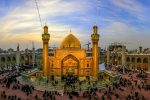
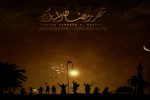
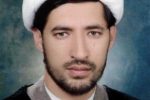
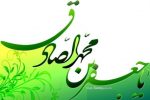
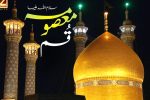

Leave a Reply